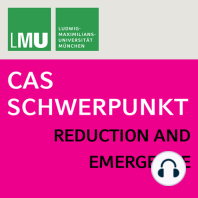28 min listen

Chaos beyond the Butterfly Effect
FromCenter for Advanced Studies (CAS) Research Focus Reduction and Emergence (LMU)
Chaos beyond the Butterfly Effect
FromCenter for Advanced Studies (CAS) Research Focus Reduction and Emergence (LMU)
ratings:
Length:
56 minutes
Released:
Jan 10, 2014
Format:
Podcast episode
Description
The sensitive dependence on initial condition associated with chaotic models, the so-called "Butterfly Effect", imposes limitations on the models’ predictive power. These limitations have been widely recognized and extensively discussed. In this lecture, Roman Frigg will draw attention to an additional so far under-appreciated problem, namely structural model error (SME). If a nonlinear model has only the slightest SME, then its ability to generate useful prediction is lost. This puts us in a worse epistemic situation: while we can mitigate against the butterfly effect by making probabilistic predictions, this route is foreclosed in the case of SME. Roman Frigg will discuss in what way the description of problems affects actual modeling projects, in particular in the context of making predictions about the local effects of climate change. | Center for Advanced Studies & Munich Center for Mathematical Philosophy: 10.01.2014 | Speaker: Dr. Roman Frigg
Released:
Jan 10, 2014
Format:
Podcast episode
Titles in the series (25)
Agent-based models as mixed-level: lessons from E.coli: Reduction and Emergence in the Sciences by Center for Advanced Studies (CAS) Research Focus Reduction and Emergence (LMU)